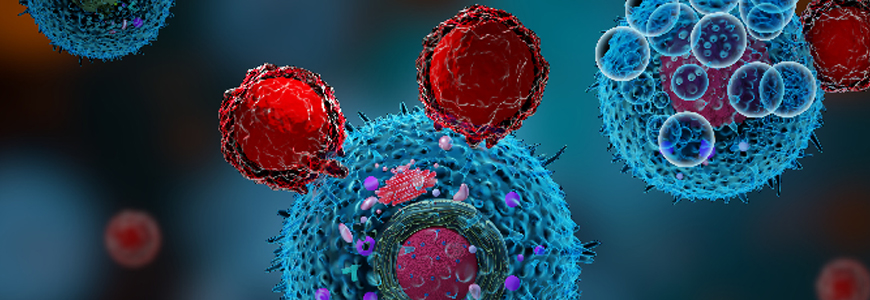An injectable drug used to reduce stubbornly high cholesterol levels appears in animal studies to also enhance the immune response of immune checkpoint inhibitors, a November 2020 study in Nature led by Duke Health researchers reported.
Based on the findings, human studies are already being proposed to determine whether cholesterol drugs such as evolocumab or alirocumab might bolster the effect of immune checkpoint inhibitors. These immunotherapies have held great promise but still result in long-term survival benefits for at most one-third of patients with cancer.
“This finding has potential for immediate translation into clinical studies,” says senior author Chuan-Yuan Li, PhD, a professor in Duke’s departments of Dermatology and Pharmacology and Cancer Biology and a member of the Duke Cancer Institute (DCI). “It suggests that neutralizing the activity of the protein PCSK9, which is targeted by the cholesterol drugs, promotes T-cell activation and thus renders tumors more responsive to immune checkpoint therapy.”
If proven to be efficacious in human clinical trials, Li says that anti-PCSK9 treatment has the potential to expand the use of immune checkpoint inhibitors in two additional categories of patients: those who do not respond to the inhibitors originally, and those who were responsive earlier but have developed resistance to them.
T-cell activity and tumor response
In the study, Li and colleagues built on previous work showing that higher numbers of active T cells improve the success of immune checkpoint blockade therapies, and that lowering blood cholesterol also appears to improve cancer immunotherapies.
The question researchers sought to resolve was whether the PCSK9 protein was involved in regulating tumor response to immunotherapy, since it is a key regulator of serum cholesterol levels. In studies of mouse tumor models, they used clustered regularly interspaced short palindromic repeats (CRISPR) gene editing techniques to delete the PCSK9 gene and found that this slowed tumor growth.
When they implanted these edited tumors in immunocompromised mice—animals without T cells—the tumors grew as fast as normal tumors in normal mice, suggesting that T-cell activity is needed for the PCSK0-neutralizing drugs to have an impact on tumors.
“That was an important revelation,” Li says. “So the next step was to combine PCSK9 inhibitors with the immune checkpoint inhibitors, which release the immune system’s brakes on T cells.”
Cholesterol-lowering therapy’s effects on tumor cells
The anti-cholesterol drugs appear to increase the amount of a protein on the tumor cell surface that signals T cells to recognize tumor cells. This led to a robust attack on the tumor, overcoming one of the key impediments to the success of immunotherapies when the body’s T cells are often inactivated, exhausted, or unable to recognize tumor cells.
As a result, the capacity of the anti-PCSK9 drugs to boost immunotherapy is independent of their abilities to lower cholesterol.
“This study demonstrates that by inhibiting the action of the PCSK9 protein, tumors grow slower,” Li says. “We have tested this in several different types of mouse tumor models and found promising effects in melanoma, breast, and colon cancers. Analysis of previously published human data also suggests that PCSK9 protein may potentially be a good target in several other types of cancers including those of liver, lung, and kidney origins.”
Translating findings into clinical trials
Based on successful immune checkpoint inhibitor therapy in a minority of patients, Li adds that researchers are actively working to identify agents that enhance its efficacy so that more patients can benefit.
“There are already a few examples of success using traditional chemotherapeutic agents and small molecule kinase inhibitors,” he says. “Compared to these, anti-PCSK9 therapy has the potential of being a relatively safe booster for immunotherapy given its excellent safety record in thousands of patients in the cardiology population.”
DCI teams have already begun to translate these preclinical data into clinical trials. Medical oncologists Tian Zhang, MD, and Scott J. Antonia, MD, PhD, co-lead a trial investigating the combination of alirocumab with cemiplimab in patients with immunotherapy-resistant, metastatic non-small cell lung cancer.
In addition, Antonia is also leading a study of evolocumab with ipilimumab and nivolumab for patients with metastatic non-small cell lung cancer in the immunotherapy-naïve setting. These trial concepts have been approved for funding as investigator-initiated trials and will be run from the DCI Center for Cancer Immunotherapy (CCI).
“These are among the first investigator-initiated trials that we are running from the CCI, and I’m proud to be part of these important efforts to translate Dr. Li’s scientific discoveries,” Antonia says.
“These trials will allow us to perform the correlative science to provide proof of concept for promising preclinical findings from Dr. Li’s laboratory—namely, that combining PCSK9 inhibitors with immune checkpoint inhibitors will increase tumor protein presentation, engage and activate T cells, and thereby improve tumor responses,” Zhang adds.
